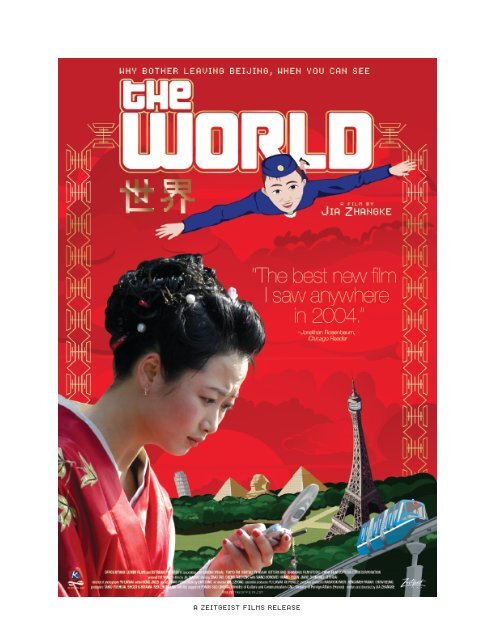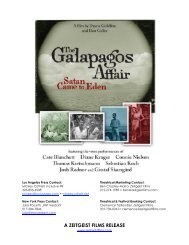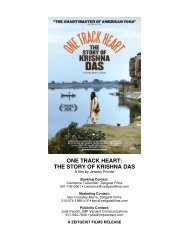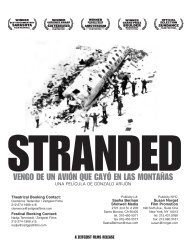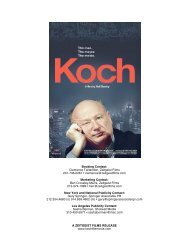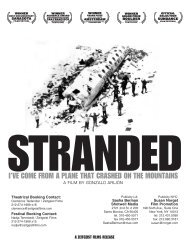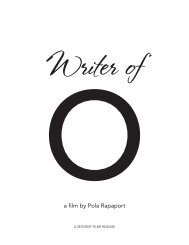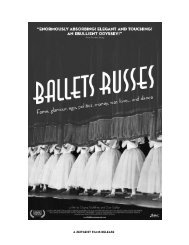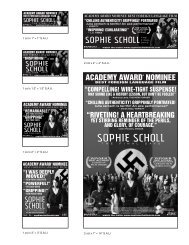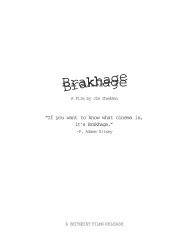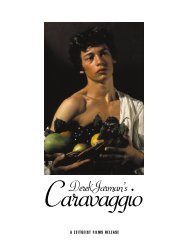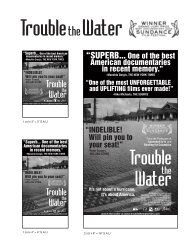You also want an ePaper? Increase the reach of your titles
YUMPU automatically turns print PDFs into web optimized ePapers that Google loves.
A ZEITGEIST FILMS RELEASE
the<br />
WORLD<br />
a film by <strong>Jia</strong> <strong>Zhangke</strong><br />
Acclaimed Chinese director <strong>Jia</strong> <strong>Zhangke</strong> (Platform, Unknown Pleasures)<br />
casts a compassionate eye on the daily loves, friendships and desperate<br />
dreams of the twenty-somethings from China’s remote Provinces who come<br />
to live and work at Beijing’s World Park. A bizarre cross-cultural pollination<br />
of Las Vegas and Epcot Center, World Park features lavish shows performed<br />
amid scaled-down replicas of the Taj Mahal, the Eiffel Tower, St. Mark’s<br />
Square, the Pyramids and even the Twin Towers. From the sensational<br />
opening tracking shot of a young dancer’s backstage quest for a Band-Aid<br />
to poetic flourishes of animation and clever use of text-messaging, <strong>Jia</strong><br />
pushes past the kitsch potential of this surreal setting—a real-life Beijing<br />
tourist destination. The Village Voice called <strong>Jia</strong> <strong>Zhangke</strong> “the world’s<br />
greatest filmmaker under forty,” and THE WORLD is his funniest, most<br />
inventive and touching work to date.
CAST OF CHARACTERS<br />
TAO<br />
A dancer at World Park who has come to Beijing from Shanxi province in Northern China three years<br />
previously with hopes of becoming a star.<br />
TAISHENG<br />
Tao’s boyfriend, also from Fenyang, who works as a security guard at World Park.<br />
WEI<br />
Also known as Xiaowei. Tao’s friend and fellow dancer at World Park.<br />
NIU<br />
Wei’s possessive boyfriend who also works as a performer at World Park.<br />
QUN<br />
A clothing designer who Taisheng accompanies on an out-of-town trip as a favor to a friend. Her husband<br />
has emigrated to France years earlier. Taisheng visits and grows increasingly attracted to Qun.<br />
ANNA<br />
A Russian dancer who has left her family behind to work in Beijing. Anna befriends Tao despite the fact<br />
that they cannot understand each other’s languages.<br />
LIANG<br />
Tao’s ex-boyfriend, who shows up at the Park one day on his way to the airport.<br />
ERXIAO<br />
Taisheng’s cousin who also works as a security guard at World Park. Taisheng is looking out for him for his<br />
uncle. Erxiao is fired after being caught stealing from the dancers’ purses backstage.<br />
SANLAI<br />
A family friend from Taisheng’s home town who comes to Beijing looking for work and finds employment<br />
on a construction site.<br />
LITTLE SISTER<br />
Real name Chen Zhijun. Another family friend of Taisheng’s who comes to Beijing with Sanlai and is killed<br />
in an accident while working overtime at the construction site. Known as Little Sister because his parents<br />
had wanted their second child to be a girl.<br />
SANMING<br />
A relative of Little Sister’s who comes to Beijing with his family to collect Little Sister’s accidental death<br />
compensation.<br />
YOUYOU<br />
A dancer at World Park who is promoted to troupe supervisor while having an affair with Park Director Mu.<br />
YANQIN<br />
Another dancer and friend of Tao’s.<br />
ZHANG<br />
A businessman who propositions Tao at the karaoke club.<br />
FEI<br />
Works as an elevator operator in World Park’s Eiffel Tower. Is fond of Erxiao.<br />
SONG<br />
Friend of Taisheng whom he plays cards with. Introduces Taisheng to Qun and asks him to accompany her<br />
on a trip to visit her gambler brother Bing.
World Park<br />
—provided by the Beijing Foreign Affairs Office<br />
Located in the Fengtai district of Beijing, 16 kilometres from the city, World Park<br />
features 106 of the most famous sites from 14 countries and regions the world over. The<br />
park, encompassing 46.7 hectares (115.4 acres), consists of two parts : the scenic area<br />
in miniature displayed according to the position of its country on the map, and a<br />
shopping, dining and entertainment area. The entertainment area is situated in an<br />
international folkloric village characterized by buildings in the American and European<br />
styles. Tourists can take an electric train and a motorboat through the park to simulate a<br />
trip around the world.<br />
The park includes most of the recognized spots of interest on the globe. Among these is<br />
the Wooden Pagoda in China’s Ying County, the world's oldest and best preserved<br />
wooden pagoda; the Leaning Tower of Pisa; the Great Pyramid of Egypt and the Eiffel<br />
Tower of Paris. China’s Qingyingjing Park, Japan’s Katsura Imperial Villa, and an Old<br />
Style US garden are grouped together to represent the splendor of the world’s different<br />
gardening styles and in recognition of the many distinctive forms which landscape<br />
gardening has taken in China.<br />
Great efforts were made to build the structures out of the same materials as the real<br />
ones. Marble and granite surfaces, together with copper and gilded sculptures, help<br />
produce a realistic effect. For instance, the Great Pyramid is made of 200,000 white<br />
marble bricks, each as large as a bar of soap. Moscow’s Red Square is paved with over 5<br />
million red bricks, each smaller than a mahjong tile. Lawns in the park are dotted with<br />
100 well-known sculptures, among them the Statue of Liberty, Copenhagen’s Little<br />
Mermaid, Michelangelo’s David and the Venus de Milo.<br />
The park also has a fountain operated by laser beams, a plant maze and a fairyland in<br />
which children and adults alike can enjoy themselves. Regular international folklore<br />
parades are planned to provide tourists with a chance to view folk customs from different<br />
countries.
BIOGRAPHIES<br />
<strong>Jia</strong> <strong>Zhangke</strong> (Director, writer)<br />
Chinese director <strong>Jia</strong> <strong>Zhangke</strong> turns to Beijing city life in THE WORLD, after confronting<br />
urbanization in Northern China in his first three features: UNKNOWN PLEASURES,<br />
PLATFORM and XIAO WU (PICKPOCKET). <strong>Jia</strong> <strong>Zhangke</strong> was born in 1970 in Fenyang, a<br />
small rural town in the northern province of Shanxi, one-hour’s drive from China’s<br />
famous Yellow River. At the age of 18, <strong>Jia</strong> studied painting in Taiyuan, the capital of<br />
Shanxi. He developed an interest in fiction, and wrote his first novel, The Sun Hung <strong>On</strong><br />
The Crotch, in 1991. Two years later, he was admitted to the Beijing Film Academy. In<br />
1995 he founded the Youth Experimental Film Group, the first independent production<br />
organization of its kind in China. With the group, he directed two award-winning videos,<br />
XIAO SHAN (GOING HOME ) and DU DU. Upon graduating from film school in 1997 he<br />
made his first feature, XIAO WU (PICKPOCKET). However, XIAO WU and his subsequent<br />
features, the epic PLATFORM (2000) and the DV-shot UNKNOWN PLEASURES (2002)<br />
were all banned by the Chinese government. THE WORLD is the first of his films to be<br />
screened in theaters in China. [For more on <strong>Jia</strong> <strong>Zhangke</strong> see James Quandt’s essay in this pressbook]<br />
Filmography<br />
1997 XIAO WU (PICKPOCKET)<br />
2000 PLATFORM<br />
2002 UNKNOWN PLEASURES<br />
2004 THE WORLD<br />
Yu LikWai (cinematographer)<br />
Yu Likwai has served as cinematographer on all four of <strong>Jia</strong> <strong>Zhangke</strong>’s features. Yu Likwai<br />
is also an acclaimed director in his own right. Both his first feature, LOVE WILL TEAR<br />
US APART (1999), and the futuristic ALL TOMORROW’S PARTIES (2003) were<br />
presented at the Cannes Film Festival. He also directed the 1996 documentary NEON<br />
GODDESSES. Born in 1966 in Hong Kong, Yu is a graduate of Belgium’s INSAS<br />
(Institut National Superieur des Arts de Spectacle). He is actively involved in<br />
productions both in Hong Kong and mainland China.<br />
Zhao Tao (LEAD ACTRESS)<br />
Zhao Tao appeared in <strong>Jia</strong> <strong>Zhangke</strong>’s PLATFORM and UNKNOWN PLEASURES. She met<br />
the director during auditions held at Shanxi University, where she was studying and<br />
teaching dance. Her dancing talent is featured in THE WORLD and UNKNOWN<br />
PLEASURES.
THE WORLD OF JIA ZHANGKE<br />
by James Quandt<br />
Not since Hou Hsiao-hsien has an Asian auteur produced a body of work of such poetic<br />
density and formal authority as <strong>Jia</strong> <strong>Zhangke</strong>—and, given the recent emergence of<br />
numerous important directors in Thailand, South Korea, and China, that is saying a great<br />
deal. Though the 35-year-old Chinese director has made only four feature films and a<br />
clutch of short video works, <strong>Jia</strong> already stands with Hou, Wong, and Tsai in the elite of<br />
Asian cinema, his each new work anticipated with the fervour once accorded the giants<br />
of European cinema.<br />
Like Hou, a bard of his country whose tone tends to the bereft, <strong>Jia</strong> has charted China’s<br />
transformation from communism to a market economy (from Mao to Thatcher, dialectical<br />
to brute materialism, as it were) in a quartet of superbly exploratory films, from the low<br />
budget, underground XIAO WU (1997) through his most recent work THE WORLD<br />
(2004), the first <strong>Jia</strong> film to be approved by Chinese officials. (Ironically, the latter is as<br />
subversive and arguably more damning a critique of the new China as <strong>Jia</strong>’s three<br />
previous features, all banned and available only on pirated DVDs in his home country,<br />
the source of a bitter in-joke in UNKNOWN PLEASURES.)<br />
Born in 1970 in Fenyang, a small rural town in Shanxi province, <strong>Jia</strong> has always been<br />
attuned to those “left behind” by the convulsive changes in Deng Xiaoping’s go go<br />
China. <strong>Jia</strong>’s first films, set in dusty, peasant outposts far from Beijing, portray a series of<br />
luckless provincials—a pickpocket, a young theatre troupe, two unemployed teenagers—<br />
oblivious to or uncomprehending of the invisible forces that buffet their lives.<br />
Bewildered or merely benumbed, they change with the styles of pop culture (karaoke<br />
bars and the influx of consumer products in XIAO WU, bell bottoms, perms, and<br />
breakdancing in PLATFORM, Taiwanese pop and international fashion in UNKNOWN<br />
PLEASURES), constantly revising their identities (like Qiao Qiao’s succession of wigs in<br />
PLEASURES), even as they are trapped in helpless stasis—a point made by THE<br />
WORLD, in which <strong>Jia</strong>’s characters finally make it to Beijing only to be immured in the<br />
artificial world of a theme park.<br />
To compare <strong>Jia</strong> with Hou runs the risk of detracting from the younger director’s<br />
originality, but the similarities of their respective approaches is often striking, especially<br />
the combination of poetry and analysis, tenderness and dispassion, embodied in a visual<br />
style that emphasizes the long, observational take. Hou remembers intuitively telling his
cinematographer, “Pull back! More detached!” In Hou, history inheres in the everyday,<br />
and the aim of his remote camera, which moves laterally or parks itself at a distance to<br />
observe, is, paradoxically, empathy and intimacy. Similarly, <strong>Jia</strong>’s watchful style, which<br />
suspends time and forces attention to social detail in XIAO WU, imposes tableaux and<br />
frieze-like compositions on the restless itinerants of PLATFORM, and conversely roves<br />
and floats in the weightless DV mobility of UNKNOWN PLEASURES, is employed with<br />
almost ethnographic objectivity, but achieves greater emotional effect than any heavy<br />
editing or close-up. “If I were to break up a scene which lasts for six or seven minutes<br />
into several cuts,” <strong>Jia</strong> has said, “then you lose that sense of deadlock. The deadlock that<br />
exists between humans and time, the camera and its subject.” To the impatient, <strong>Jia</strong>’s<br />
“deadlock” will translate as aloofness or aesthetic impasse, but his withholding pays off,<br />
as we shall see, in poignancy.<br />
<strong>On</strong>e could list many other similarities between Hou and <strong>Jia</strong>, including their marked<br />
sympathy for unmoored youth—though <strong>Jia</strong>’s is more autobiographical, Hou’s more<br />
distantly empathic—and concern with identity (national, individual); their elliptical<br />
narratives, complex employment of offscreen space, and acute awareness of how history<br />
impinges upon the personal; their vivid sense of landscape, use of pop music as both<br />
catharsis and commentary, neo-Brechtian emphasis on performance (<strong>Jia</strong>’s films are full<br />
of dances, songs, shows), and—most markedly—their tragic sense of life as an accrual<br />
of loss and injury, of broken or vanished ideals and irretrievable loves. Some of their<br />
films could profitably be paired to reveal affinities of theme, shooting style, or narrative<br />
approach: Hou’s THE PUPPETMASTER with <strong>Jia</strong>’s PLATFORM, GOODBYE SOUTH<br />
GOODBYE or THE BOYS OF FENGKUEI with UNKNOWN PLEASURES, MILLENNIUM<br />
MAMBO with THE WORLD.<br />
Though <strong>Jia</strong> lists, along with Chen Kaige’s YELLOW EARTH, Bresson’s A MAN ESCAPED<br />
and De Sica’s THE BICYCLE THIEF, Hou’s FENGKUEI as one of his formative influences<br />
and pays homage to it with an intertitle “The Boys of Fenyang” in the version of THE<br />
WORLD released in China, <strong>Jia</strong>’s debt to Hou can be overstated. <strong>Jia</strong>’s aesthetic, at least<br />
in the early films, owes more to neorealism and documentary, even reportage, than does<br />
Hou’s, and his singular, designed audioscapes, which incorporate copious amounts of<br />
stray or found sound in their inquisitive richness are markedly different from those of<br />
Hou. Neither does <strong>Jia</strong>’s interest in history have the magisterial reach of Hou’s epics; the<br />
younger director sticks mostly to what he knows from direct observation. <strong>On</strong>e cannot<br />
quite imagine in a Hou film the welter of contemporary political references in<br />
UNKNOWN PLEASURES: the bombing of a textiles plant, crackdowns on Falun Gong,<br />
China’s entry into the World Trade organization, a collision between US and Chinese
military planes, the 2008 summer Olympics coming to Beijing. Likewise, though Hou is<br />
not immune to homage (to Ozu in GOOD MEN GOOD WOMEN, for example), he would<br />
resist the blunt insouciance with which <strong>Jia</strong> invokes PULP FICTION in UNKNOWN<br />
PLEASURES.<br />
Perhaps accounting for their popularity in Japan—both directors’ recent films have<br />
Japanese producers, including Takeshi Kitano—<strong>Jia</strong> and Hou, like Ozu and Naruse, are<br />
subtle chroniclers of societal transition whose rigorous visual and narrative styles are<br />
aesthetic accomplices to sentiment. Emotion in their films, particularly melancholy,<br />
nostalgia, and longing, is heartfelt, unstinting. Hou’s films can fell a viewer with their<br />
blinding sadness or their sudden release of hoarded sorrow—e.g. the conclusion of<br />
GOOD MEN GOOD WOMEN. <strong>Jia</strong>’s are no less poignant. The pickpocket naked in a<br />
bathhouse and singing his soul out, or his presence crowded from the image altogether<br />
to express his humiliation in XIAO WU; the All Star Rock and Breakdance Electronic<br />
Band performing by the side of a highway near the Yangtze, literally and metaphorically<br />
sidelined by the setting, by time and history, in PLATFORM; Qiao Qiao doing a doleful<br />
dance after she breaks up with her boyfriend or Bin Bin being forced to sing his favourite<br />
song by a policeman in UNKNOWN PLEASURES; the peasant father tearfully stuffing<br />
the money he has been paid for his dead son into his coat in THE WORLD—the<br />
catalogue of such moments and images in <strong>Jia</strong>’s films, from the merely forlorn to the<br />
outright anguished, is ample. Datong, Fenyang, Beijing—all cities of sadness.<br />
When it was rumoured that <strong>Jia</strong>’s new film, THE WORLD, was to be made in “the system”<br />
—i.e. with the approval of the Chinese Film Bureau—many claimed that the<br />
underground radical had sold out. Some erstwhile supporters contend that the film is<br />
more conventional than his previous three, either because of its comparatively lavish<br />
production values, its tonal sophistication, or its determinist narrative. Hardly. From its<br />
first plaintive, repeated cry, “Does anyone have a Band Aid?” to its ghostly final question<br />
about beginnings and endings, THE WORLD takes great aesthetic and political risks,<br />
extending in every way <strong>Jia</strong>’s formal methods and thematic preoccupations, and offers his<br />
most devastating critique yet of China’s rush to erect a shining facsimile of civilization<br />
over the broken hopes of a generation.<br />
– James Quandt, Cinematheque <strong>On</strong>tario
<strong>Jia</strong> <strong>Zhangke</strong> on...<br />
Life in the Big City<br />
My previous films dealt with and were shot in my native northern Shanxi province. As I’ve<br />
now been living in Beijing for over a decade, I decided to make a film that reflected my<br />
impressions of Beijing, of urban life. A couple of years ago I went to visit my cousin who<br />
still lives in my hometown. He felt more alone than ever, because most young people have<br />
left the countryside to work in big cities or in the South, where the economy is much<br />
better. Mostly old people and the disabled remain in the village. The land is not being<br />
farmed; the streets are practically deserted. My cousin asking me about life in Beijing<br />
made me think about the crowds and liveliness of the city’s streets. It’s too difficult to<br />
explain what goes on in the big city. I felt I had to show it by making a film about Beijing.<br />
The Rest of the World<br />
The park’s monuments are meant to satisfy people’s longing for the rest of the world. The<br />
park demonstrates the Chinese people’s strong curiosity about the world and their interest<br />
in becoming a part of global culture. I think our impressions about the world are actually<br />
only our impressions about our own life and the environment we live in. I think people can<br />
only see their own lives, can really only look at things from where they stand. This thing<br />
we call “the world” is really just our own little corner of the world. I thought the World<br />
Park environment would give a particular universality to the film. The story wouldn’t be<br />
only Chinese, it would sort of take place visually in different parts of the world.<br />
Fake Landscape, Real Problems<br />
The landscape in the theme park is fake, but the problems the characters face are very<br />
real. The characters who live and work there appear to easily travel from one country to the<br />
next in a world without borders. But in reality, they are isolated in a secluded world of<br />
miniature replicas of the Eiffel Tower, Lower Manhattan, Mount Fuji, the Pyramids.<br />
Replicas can be physically built, but not lives, nor societies, nor traditional cultures. The<br />
characters in THE WORLD must face their past pain. Increased globalization won’t reduce<br />
the gap created by history. It won’t diminish the complications of our awakening age.<br />
Accelerated Urbanization<br />
The past decade has been the most violent in terms of urbanization in mainland China.<br />
The upcoming 2008 Olympics in Beijing have boosted even more urbanization. The city<br />
has become a giant construction site, a shopping mall, a parking lot. Human contact<br />
changes enormously in an economic boom. Large social gaps are created between people
of different income levels, especially between the big cities and rural areas. Resources are<br />
concentrated in a handful of big cities. The modern idea of making one’s own life can only<br />
be found in the big cities. A plus is that entertainment activities have found their place<br />
and clientele. <strong>On</strong> the other hand, thousands have lost their jobs. Skyscrapers are shooting<br />
up like mushrooms, but human bodies are dropping at the same speed. Workers arriving<br />
from rural areas sacrifice their health, even their lives.<br />
Surreal Becomes Real<br />
More and more, I get the feeling that the surreal has become reality in Beijing. This is<br />
what I kept in mind during the making of THE WORLD. Because of urbanization, I think<br />
the city has lost its notions of the differences between night and day, the four seasons. We<br />
have gained speed by completely losing slowness. It’s the same in all of China’s big cities.<br />
This led me to thinking about our connection to the virtual network. From one word to<br />
another, from one person to another. Relationships both free and restricted, deep and<br />
superficial. All part of our perception of this world.<br />
Text Messaging<br />
SMS text messaging by cell phone is the preferred means of communication of young<br />
people. It’s used for greetings, making appointments and even things it’s hard to say faceto-face.<br />
I think inserting such messages into the film gave me the chance to work a little<br />
like the directors of the silent era. Title phrases can be like an inner voice or password to<br />
move the story along. We are living in the digital age. As important in communication as in<br />
other areas, like the format used in the making of THE WORLD.<br />
The Silent Expression of Deep Feelings<br />
My films have always had scenes dealing with performance. The stage is always present.<br />
I’m very attached to that lifestyle because when I was in high school, I traveled with a<br />
theater group. THE WORLD has some elements of a musical, but it's not a musical. The<br />
stage shows are linked to changes in the characters’ states of mind and the things they<br />
are experiencing in daily life. For me, dance is the silent expression of deep feelings. In<br />
THE WORLD, the main characters experience pain inexpressible in the spoken word. They<br />
must resort to gestural language. I created outlets of silent expression for them. In the<br />
snow dance number, Tao doesn’t say a word, but the public can share her feelings.<br />
Expression is important, but so is silence.<br />
Musical Back-up<br />
The original music of THE WORLD was composed by Taiwanese musician Giong Lim. He<br />
composed music for Hou Hsiao-Hsien’s GOODBYE SOUTH GOODBYE and MILLENIUM
MAMBO. In my previous films I never used long pieces of music, but for THE WORLD I<br />
thought of Giong Lim’s electronic music. The artifice of World Park and the film’s everpresent<br />
solitude and silent nights seemed to be calling out for musical back-up. The<br />
important stage shows are also accompanied by Giong Lim’s music. These luxurious, but<br />
sad dance numbers signify the real emptiness of the lives of Tao and her friends. Life’s<br />
heaviness fades when confronted by the silky lightness of dance and music.<br />
Tao’s Animated Interior Life<br />
The animation sequences in THE WORLD show the virtual world which becomes Tao’s<br />
interior life. Many young people turn to the Web or virtual worlds created by video games.<br />
These are non-physical worlds that cannot be ignored. They connect here and there with<br />
the real world. I wanted to show an atmosphere of a very Asian-digital age by combining<br />
the animation sequences with SMS text messaging and electronic music.<br />
No Change in the Creative Process<br />
THE WORLD is my first film shot with state approval. As of 2004, the five-year<br />
government ban against my filmmaking was lifted. The State Film Bureau has also<br />
announced many new progressive policies. This more relaxed atmosphere in Chinese<br />
cinema is the result of a decade of hard work by independent filmmakers. The Chinese<br />
government, the public and the media are all trying to understand and welcome so-called<br />
“outside” projects into the official system. As for me personally, government approval did<br />
not markedly change my creative process. My basic principle as a filmmaker stayed the<br />
same – to protect the independence of my research on society and people. Whether I<br />
shoot openly or in secret, my work cannot be influenced because during the shoot I am a<br />
filmmaker and nothing else.<br />
Freely Reaching the Chinese Audience<br />
The biggest change that comes with state approval is that THE WORLD will be my first<br />
film allowed open distribution in China. It will be released with the support of the staterun<br />
Shanghai Film Studio. I have waited seven years for this moment. My previous three<br />
features, XIAO WU (PICKPOCKET), PLATFORM and UNKNOWN PLEASURES did not<br />
receive permission to be shown publicly. They were seen only on pirated DVD. I traveled<br />
around to major Chinese cities for projections in restricted circles, usually in cafés or<br />
universities. But now my films can freely reach the Chinese audience. Now people will be<br />
able to see my movies in theaters.
the<br />
WORLD<br />
Cast<br />
Tao ZHAO Tao<br />
Taisheng CHEN Taishen<br />
Wei JING Jue<br />
Niu JIANG Zhongwei<br />
Qun HUANG Yiqun<br />
Sanlai WANG Hongwei<br />
Liang LIANG Jingdong<br />
Erxiao JI Shuai<br />
Youyou XIANG Wan<br />
Anna Alla CHTCHERBAKOVA<br />
Crew<br />
Director-Writer JIA <strong>Zhangke</strong><br />
Cinematography YU Likwai<br />
Art Director WU Lizhong<br />
Sound ZHANG Yang<br />
Editor KONG Jinlei<br />
Music LIM Giong<br />
Associate Producers YU Likwai<br />
XU Pengle<br />
Executive Producers MASAYUKI Mori<br />
Hengameh PANAHI<br />
CHOW Keung<br />
Producers TAKIO Yoshida<br />
SHOZO Ichiyama<br />
REN Zhonglun<br />
Produced by OFFICE KITANO, LUMEN FILMS<br />
and XSTREAM PICTURES<br />
in association with BANDAI VISUAL, TOKYO FM<br />
DENTSU TV ASAHI BITTERS END<br />
SHANGHAI FILM STUDIO CHINA FILM<br />
COPRODUCTION CORPORATION<br />
with the support of FONDS SUD CINEMA,<br />
Ministry of Culture and Communication-CNC,<br />
Ministry of Foreign Affairs (France)<br />
China - 2004 - 139 mins - 35mm - Color - 2:35 - Dolby Digital<br />
In Mandarin and Shanxi dialect with English subtitles<br />
ZEITGEIST FILMS LTD.<br />
247 CENTRE ST • 2ND FL • NEW YORK • NY 10013<br />
www.zeitgeistfilms.com • mail@zeitgeistfilms.com<br />
(212) 274-1989 • FAX (212) 274-1644


